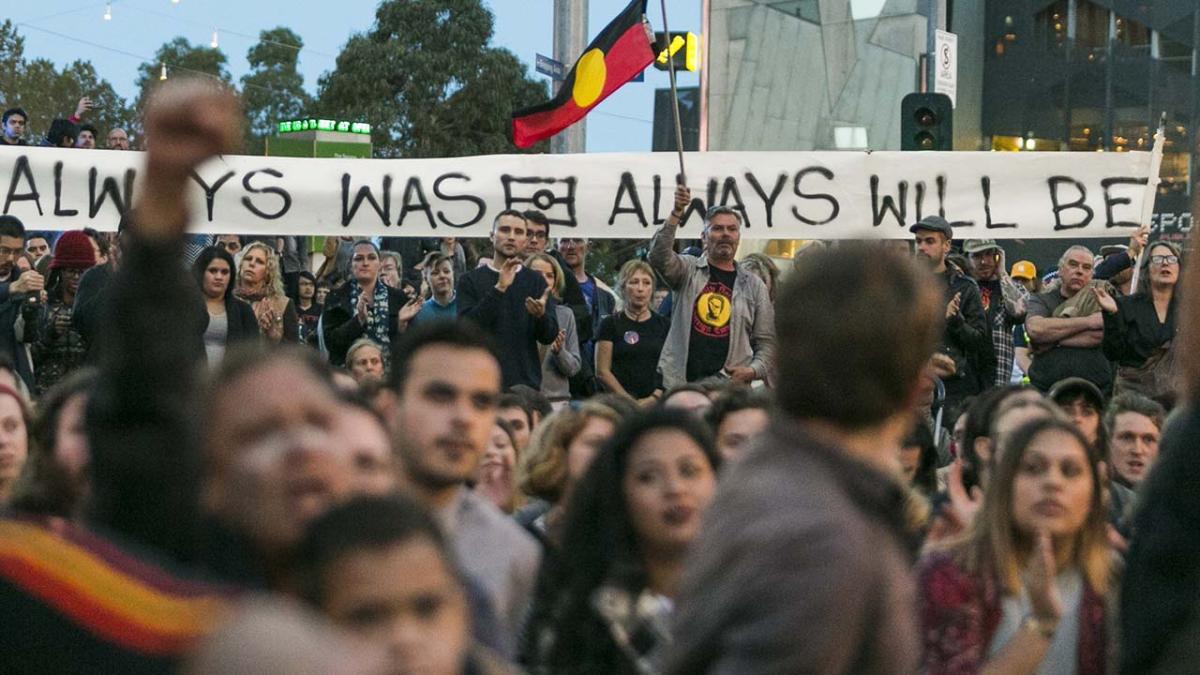
First Nations-owned business Clothing The Gaps has called out a man who is attempting to trademark the phrase ‘Always Was Always Will Be’, which, if successful, would take away a term that’s historically been used to fight for Aboriginal land rights in this country.
According to screenshots of the application shared by the Wiradjuri Country Instagram account @place_names_in_addresses, on January 26th, 2021 (yeah, on Invasion Day of all days), a man named Christopher Michaelides, who has been alleged by First Nations-business Clothing the Gaps as not being an Indigenous person, filed a trademark application for “Always Was, Always Will Be”. If successful, it would basically allow Michaelides to have the exclusive right to sell clothes and merchandise with the slogan.
View this post on Instagram
In case you forgot this lesson in high school, per the Australian Museum, the term originally comes from the Indigenous land rights movement in far west NSW during the 1980s. “Barkandji people were fighting for legal recognition and rights as sovereign owners of their homelands.”
The quote came about during a conversation between the late Barkandji man and land rights activist Uncle William Bates and his father Uncle Jim Bates. When Uncle Jim excitedly shared stories of his Country, Uncle William said, “Dad, it’s not your land anymore, whitefellas own it.” In response, Uncle Jim reminded him: “No, they only borrowed it. It always was and always will be Aboriginal land.”
That phrase has been used throughout First Nations Peoples’ civil rights movements across the country. So, it isn’t hard to see why the idea of someone trying to claim ownership of it on a pair of thongs or singlet is being seen as a move by a TV show villain named Mr. Dickbag Douchehead. TL;DR: it’s an aggressively capitalist way of silencing Blak voices and Blak businesses.
Clothing The Gaps has been closely following this application and said in a recent Instagram Article on Tuesday that it’s “outraged”.
“Certain Aboriginal phrases belong to our whole community, not individuals,” a representative for the brand said in the post.
“It’s particularly shameful when non-Indigenous people try to take ownership of our language, history and struggle.”
View this post on Instagram
Clothing The Gaps also claims that they’ve obtained a copy of the adverse report from April 12th last year which found that the application had been objected to. On November 12th, Michaelides then sought for his application to be reviewed again and faced a similar report on the 18th of that same month.
In a statement shared with PEDESTRIAN.TV, an IP Australia spokesperson appeared to confirm these findings, telling us that “the process for trademark examination includes an opportunity for the person making the application to address issues identified during the standard examination period, which is up to 15 months from the date of the first report”.
From there, “any trademark which is accepted following examination then proceeds to an advertising period where other parties can oppose the trademark”.
They also clarified that the current status of the application is “under examination”.
“This means that the trademark applicant is seeking a trademark on the goods claimed in the application (a range of clothing and apparel) and the application for this trademark is being assessed in line with the provisions of the Trade Marks Act 1995,” they said.
“IP Australia is aware that the protection of culture, expression and language is important for Aboriginal and Torres Strait Islander peoples. IP Australia is looking at ways the intellectual property (IP) system can better support Aboriginal and Torres Strait Islander peoples, communities and businesses to utilise and protect their Indigenous Knowledge.”
The clothing brand’s lawyers claim that there’s a “very unlikely” chance that Michaelides will be able to overrule the objection of his application. He’d need a substantial amount of evidence to push back on the examiner’s conclusion — think big sales numbers, advertising figures, and examples of the slogan used on his products.
However, that doesn’t change the fact that this is an attempt by an individual to take away a part of First Nations Peoples’ language, history and culture, and communities’ shared experience as victims of colonisation.
Back in 2020, national conversations began around buying out the copyright to the Aboriginal flag, which in extremely batshit news to me is not actually free to use.



